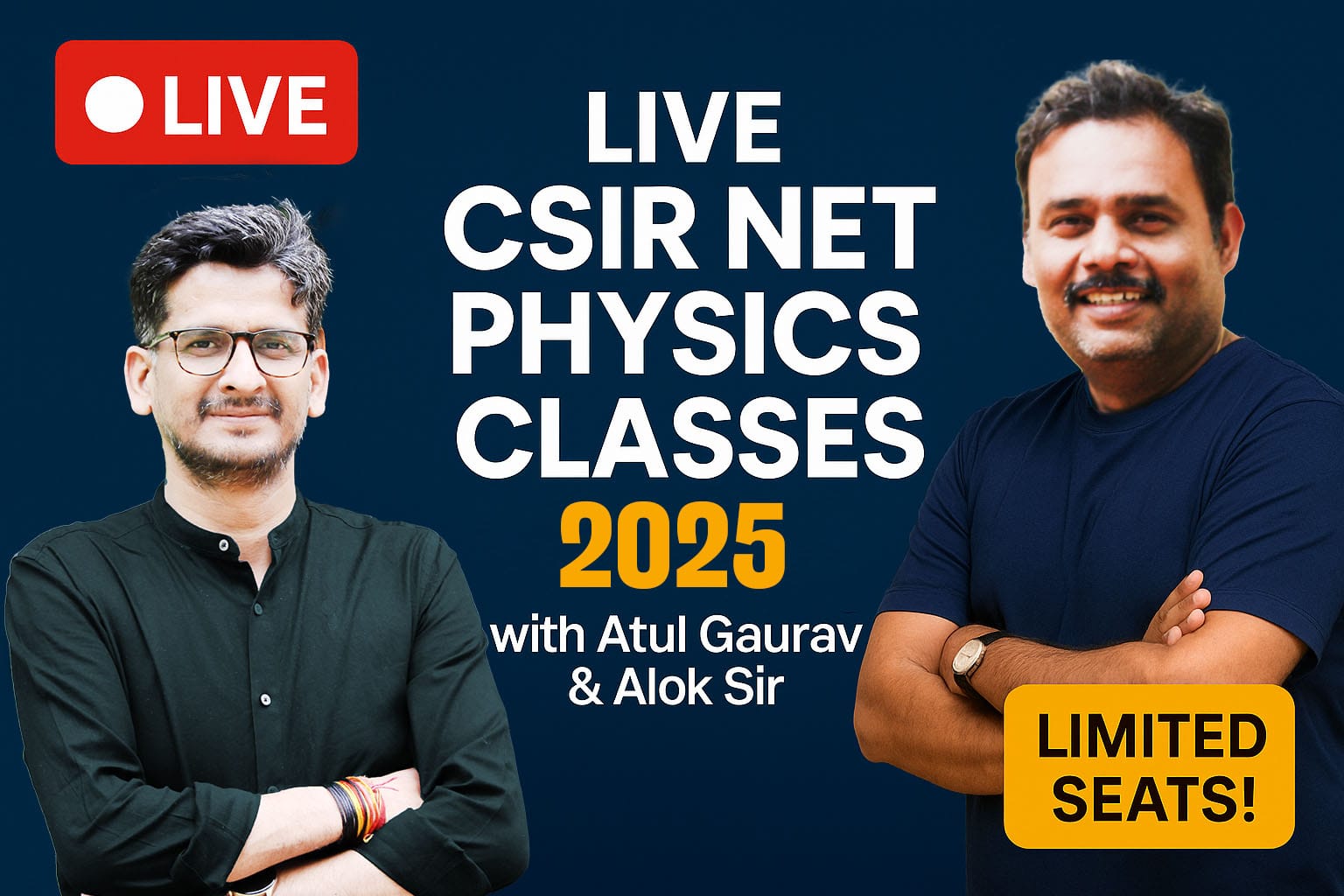CSIR NET Physics Coaching Online
Course Overview
Elevate your skills with our CSIR NET Physics Coaching Online program, designed to take you from mastering theory to advanced problem-solving. Our live classes help you build a strong foundation by exploring core physics topics and showing how they apply to solving numerical problems. You’ll receive a comprehensive understanding of the CSIR NET Physics syllabus, plus key concepts and skills asked in the past 10 years of exams.
Gain access to a rich collection of CSIR NET Physics materials, including practice problems, solutions, and regular tests to track your progress. Whether you’re preparing for CSIR NET, GATE Physics, JEST, TIFR, BARC, DRDO, or university exams, our expert-led course equips you to excel.
Join us to confidently crack the exam with our comprehensive CSIR NET Physics coaching online!
Course Summary for CSIR NET Physics Coaching Online
CURRICULUM
PART ‘A’ (General Aptitude)
This part shall carry 20 questions pertaining to General Science, Quantitative Reasoning & Analysis and Research Aptitude. The candidates shall be required to answer any 15 questions. Each question shall be of two marks. The total marks allocated to this section shall be 30 out of 200.
PART ‘A’ CORE
- Dimensional Analysis: Importance and applications in physical problems.
- Vector Algebra and Calculus: Fundamental operations, vector identities, and theorems.
- Linear Algebra: Matrices, Cayley-Hamilton Theorem, Eigenvalues, and Eigenvectors.
- Ordinary Differential Equations: Solutions of first and second-order linear equations.
- Special Functions: Hermite, Bessel, Laguerre, and Legendre functions.
- Fourier Series and Transforms: Applications in solving periodic functions.
- Laplace Transforms: Use in solving differential equations.
- Complex Analysis: Analytic functions, Taylor & Laurent series, and applications.
- Residue Theorem: Evaluation of integrals using poles and residues.
- Probability Theory: Random variables, binomial, Poisson, and normal distributions.
- Central Limit Theorem: Importance in statistical physics.
- Newton’s Laws: Application in dynamical systems and stability analysis.
- Central Force Motion: Analysis of planetary orbits.
- Two-Body Collisions: Scattering in laboratory and center of mass frames.
- Rigid Body Dynamics: Moment of inertia tensor and applications.
- Non-inertial Frames: Concepts of pseudoforces.
- Lagrangian and Hamiltonian Formalism: Generalized coordinates, equations of motion, and cyclic coordinates.
- Variational Principle: Derivation of equations of motion.
- Special Theory of Relativity: Lorentz transformations and relativistic kinematics.
- Electrostatics: Gauss’s law, boundary value problems, Laplace, and Poisson equations.
- Magnetostatics: Biot-Savart law and Ampere’s theorem.
- Maxwell’s Equations: In free space and media, with boundary conditions.
- Electromagnetic Waves: Propagation, reflection, refraction, and polarization.
- Interference, Coherence, and Diffraction: Analysis using electromagnetic theory.
- Charged Particles in Electromagnetic Fields: Dynamics and motion in static and uniform fields.
- Wave-Particle Duality: Foundations and key experiments.
- Schrödinger Equation: Time-dependent and time-independent forms, and their applications.
- Eigenvalue Problems: Harmonic oscillator, particle in a box, and tunneling.
- Angular Momentum Algebra: Orbital and spin angular momenta, addition of angular momenta.
- Hydrogen Atom: Energy levels and wave functions.
- Perturbation Theories: Time-independent and time-dependent, Fermi’s golden rule.
- Identical Particles: Pauli exclusion principle and spin-statistics connection.
- Laws of Thermodynamics: Their consequences and thermodynamic potentials.
- Phase Equilibria: Maxwell relations and chemical potential.
- Statistical Ensembles: Microcanonical, canonical, and grand-canonical ensembles.
- Partition Functions: Connection to thermodynamic quantities.
- Quantum Statistics: Bose-Einstein and Fermi-Dirac distributions.
- Blackbody Radiation: Planck’s law and applications.
- Semiconductor Devices: Diodes, transistors, and field-effect devices.
- Opto-electronic Devices: Solar cells, LEDs, and photo-detectors.
- Operational Amplifiers: Applications in signal conditioning and amplification.
- Digital Techniques: Registers, counters, comparators, and converters (A/D and D/A).
- Data Analysis: Precision, accuracy, error analysis, and least squares fitting.
PART ‘B’ ADVANCED
- Green’s Function: Solutions of partial differential equations (Laplace, wave, heat).
- Computational Techniques: Root finding, interpolation, numerical integration, and differential equation solutions.
- Tensors and Group Theory: Introduction to SU(2) and O(3).
- Poisson Brackets and Canonical Transformations: Symmetry, invariance, and Noether’s theorem.
- Hamilton-Jacobi Theory: Applications in mechanics and integrable systems.
- Plasma Physics: Dispersion relations and wave propagation.
- Radiation: From moving charges and retarded potentials.
- Spin-Orbit Coupling and Fine Structure: Energy corrections and fine structure in atoms.
- WKB Approximation: Semi-classical approach to quantum problems.
- Relativistic Quantum Mechanics: Klein-Gordon and Dirac equations, applications in particle physics.
- Phase Transitions: First- and second-order transitions, magnetism models.
- Non-equilibrium Processes: Diffusion, Brownian motion, and random walks.
- Measurement and Signal Conditioning: Transducers, impedance matching, noise reduction.
- Advanced Techniques: Fourier transforms, lock-in amplifiers, and modulation techniques.
- Quantum States of Electrons: Fine structure, Zeeman effect, and hyperfine interactions.
- Spectroscopy: Rotational, vibrational, and Raman spectra of molecules.
- Lasers: Principles of operation, Einstein coefficients, and population inversion.
- Crystallography: Bravais lattices, diffraction, and structure factors.
- Electronic Properties: Free electron theory, band theory, and superconductivity.
- Defects and Ordered Phases: Liquid crystals, quasi-crystals, and phase transitions in solids.
- Nuclear Structure: Shell model, liquid drop model, and nuclear forces.
- Decay Processes: Alpha, beta, and gamma decays.
- Elementary Particles: Classification, quantum numbers, and symmetry principles.
- Nuclear Reactions: Fission, fusion, and reaction mechanisms.



